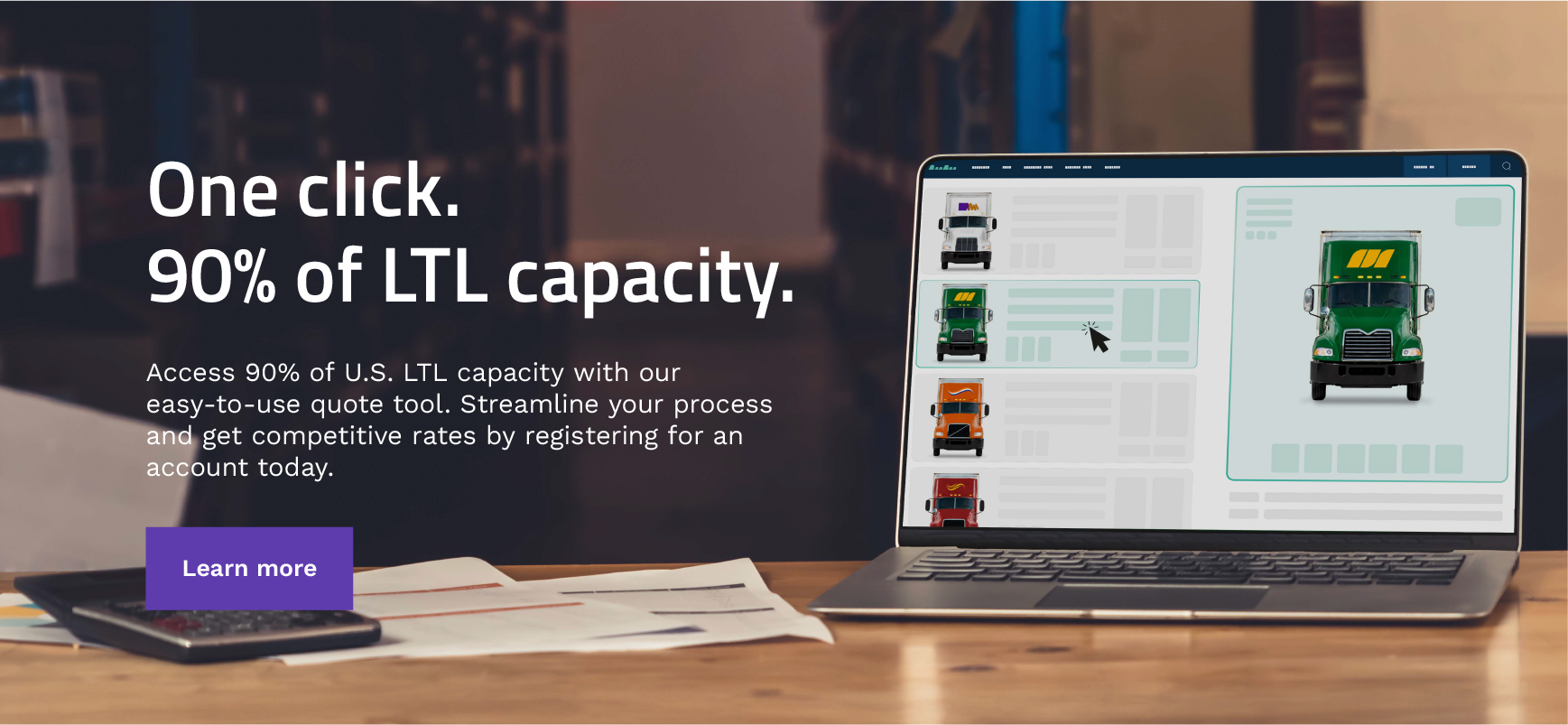What is a freight broker, and what do they do?
Freight brokerages play a crucial role in facilitating the movement of goods across various modes of transportation, including trucks, rail, air and sea. Essentially, they connect companies who need to ship goods (shippers) with transportation providers (carriers) who have the capacity to move those goods, and they provide valuable support along the way.

Freight brokers work with both large and small companies across industries, and they offer a range of services, including:
- Arranging the transportation of goods by matching shippers with the most suitable carrier for their needs and requirements
- Using their buying power and experience to negotiate rates on behalf of the shipper
- Managing the logistics and coordination of shipments — arranging pickup and delivery schedules, tracking shipments in transit and ensuring shipments reach their destination within the agreed timeframe.
- Managing the paperwork and documentation associated with the transportation process, including preparing bills of lading and other shipping documents — ensuring all necessary documentation is accurate, complete and compliant with regulations
- Supporting both shippers and carriers by acting as a single point of contact, addressing concerns, providing status updates and resolving any issues that arise during transit
What types of freight brokers are there?
Within the realm of freight brokerage, types of brokers include:
Asset-Based Freight Brokerage
This type of broker not only arranges transportation services but also owns and operates its own assets, such as trucks, trailers and containers. In addition to acting as an intermediary between shippers and carriers, asset-based freight brokers have their own fleet of vehicles and infrastructure to provide transportation services directly. By leveraging its assets and brokerage network, this type of company can offer a broader range of services, including truckload brokerage, LTL brokerage, dedicated transportation solutions, expedite delivery options and specialized equipment.
Non-Asset-Based Freight Brokerage
This type of broker facilitates the transportation of goods without owning or operating any transportation assets. They maintain a network of carriers across various transportation modes, including trucking companies, railroads and shipping lines and have established relationships with them to match shippers with suitable transportation options.
Specialized freight brokers
This type of broker usually is smaller as they focus on arranging transportation services for specific types of freight. Unlike general freight brokers that handle a wide range of goods, specialized brokers have in-depth knowledge of a particular niche.
What makes a good freight broker
In addition to extensive experience and a deep understanding of the transportation industry — including logistics process, regulations, market trends and best practices, here are some characteristics you’ll want to look for in a freight broker:
- Strong carrier relationships: A good broker must build and maintain a robust network of carriers. This happens when they’re committed to their carriers’ success — treating them with the respect they deserve, clearly communicating, keeping their trucks filled, and offering loads in the lanes they want to drive in.
- Trusted customer partnerships: The best brokers aren’t just focused on filling trucks. Instead, they partner with their customers, listen to understand their needs and goals and match them to the best carrier(s) for their load. And they’re clear communicators that are available when customers need them in the way they want to communicate with them.
- Committed capacity and ability to provide multiple transportation modes: Good brokers have access to committed capacity to ensure loads are picked up no matter what. They also have access to multiple transportation modes, allowing flexibility when needs or the shipping environment changes.
- Technology that supports shippers and carriers: Robust technology leveraged for efficiency and productivity is essential for effective freight brokerage. Good brokers use transportation management systems, online platforms and digital tools to streamline operations, track shipments and communicate with shippers and carriers.
Selecting a partner for your freight brokerage needs
Because brokers act in your agency, working for you and protecting your best interests, it’s essential to partner with one you’re comfortable working with that meets the characteristics of a good freight broker and offers the capabilities you need.
It’s good practice to start your selection process with a needs assessment. Consider your specific transportation requirements, such as the type of freight you need to ship, the volume of shipments you’ll have, your desired transit times, any specialized equipment or handling requirements, and any industry requirements you need to comply with. This will help you evaluate whether a broker can meet your requirements.
Once you evaluate potential brokers, look at things like experience, expertise, their network of carriers and the range of services they offer. Then, to help ensure they meet legal requirements and industry standards, verify credentials and compliance, including ensuring they hold the necessary licenses and certifications, including with regulatory bodies like the Federal Motor Carrier Safety Administration (FMCSA).
Finally, evaluate their technology capabilities. Inquire about their transportation management systems, their ability to provide tracking and updates, and their communication tools.
Consider ArcBest for your freight brokerage needs
ArcBest is an integrated logistics company with 100 years of experience, and we’re positioned to help with your transportation needs, whatever they may be.
With less-than-truckload solutions through our best-in-class LTL carrier ABF Freight and an extensive LTL brokerage network, and truckload solutions through our own equipment and our extensive truckload brokerage network, including those offered through our truckload brokerage service MoLo, we fall into the “asset-based freight brokerage” category. That means you get the flexible capacity you need, when and where you need it, at a competitive market rate. And our industry-leading technology, developed to support both shippers and carriers, offers enhanced visibility, real-time tracking and updates and robust reporting capabilities — making it easier for you to do business.








